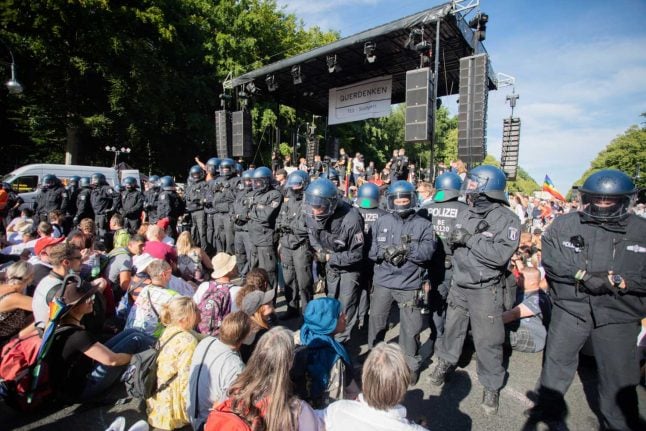The unruly protests, in which many demonstrators failed to wear masks or respect social distancing rules, have sparked a chorus of condemnation including calls for tougher penalties against those who violate restrictions aimed at curbing transmission of the deadly virus.
A total of 133 people were arrested during Saturday's protests, which included a huge “day of freedom” demo against coronavirus restrictions, police said in a statement on Sunday.
The arrests were for offences including resisting police officers, breach of the peace and the use of unconstitutional symbols.
Three officers required hospital treatment, police said. Around 20,000 people took part in the “day of freedom” demonstration, the majority not covering their nose and mouth or respecting Germany's 1.5-metre (five-foot) social distancing requirement.
The crowd, a mixture of hard left and right, and conspiracy theorists, shouted “We are the second wave” as they converged on the Brandenburg Gate, demanding “resistance” and dubbing the pandemic “the biggest conspiracy theory”.
Police began dispersing the crowds in the late afternoon, but hundreds of protesters remained at the Brandenburg Gate late into the evening.
Police have launched legal proceedings against organisers for not respecting virus hygiene rules.
In a separate anti-fascist demonstration in the southern Neukoelln district, protesters threw stones at police officers, let off fireworks and damaged two police vehicles and a local party office.
Several officers were injured while dispersing the crowd, including three who were treated in hospital after being hit in the face by shards of glass. Arrests were also made at smaller unofficial protests.
A total of 1,100 officers were deployed during the day.
'Serious consequences'
A few hundred protesters gathered to the west of the Brandenburg Gate on Sunday, according to an AFP photographer at the scene, with the majority wearing masks and observing social distancing guidelines.
Despite Germany's comparatively low toll, authorities are concerned at a rise in infections over recent weeks and politicians took to social media to criticise Saturday's rally as irresponsible.
“Yes, demonstrations should also be possible in times of coronavirus, but not like this,” Health Minister Jens Spahn said.
“Distance, hygiene rules and masks serve to protect us all, so we treat each other with respect.” Others on Sunday expressed concern at Germany's rising virus numbers and called for higher penalties for those who break the rules.
“Those who deliberately endanger others must expect that this will have serious consequences for them,” Economy Minister Peter Altmaier told national news agency DPA.
Bavarian premier Markus Soeder, meanwhile, warned in an interview with the Bild am Sonntag newspaper that now was “not the time for new relaxations or naive carelessness”. The second wave is “practically already here”, Soeder said.
“It is creeping through Germany.” Soeder also said he was opposed to football matches with spectators, as officials from Germany's Bundesliga prepare to gather this week to agree guidelines for the return of fans.
Saturday saw 955 new infections in Germany — a level which the country had not seen since May 9, according to the Robert Koch Institute (RKI) disease control agency.
New infections rose only slightly by 240 in the last 24 hours, according to data published Sunday by the RKI. However, the relatively low figure was due to limited reporting by local authorities during the weekend.



 Please whitelist us to continue reading.
Please whitelist us to continue reading.
Member comments